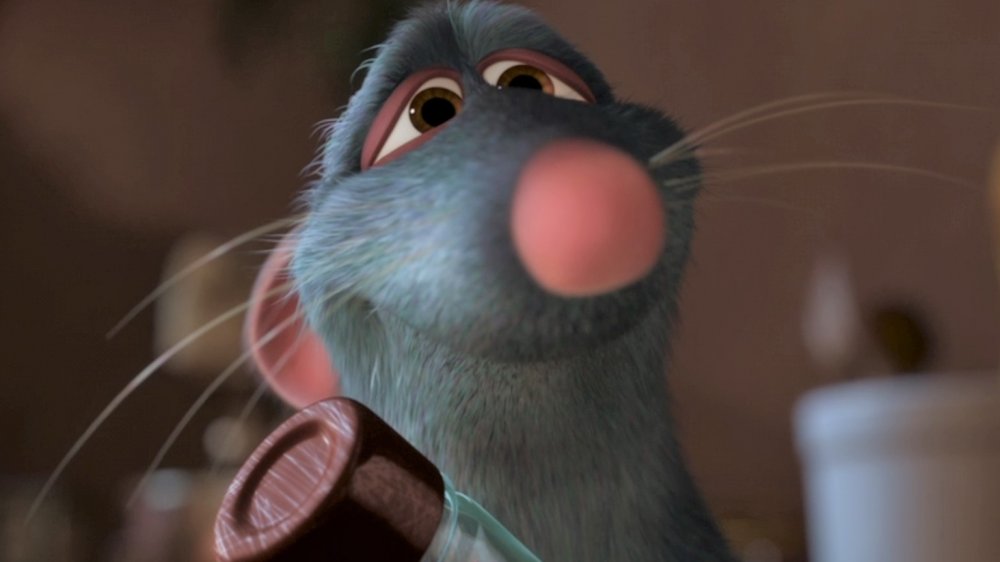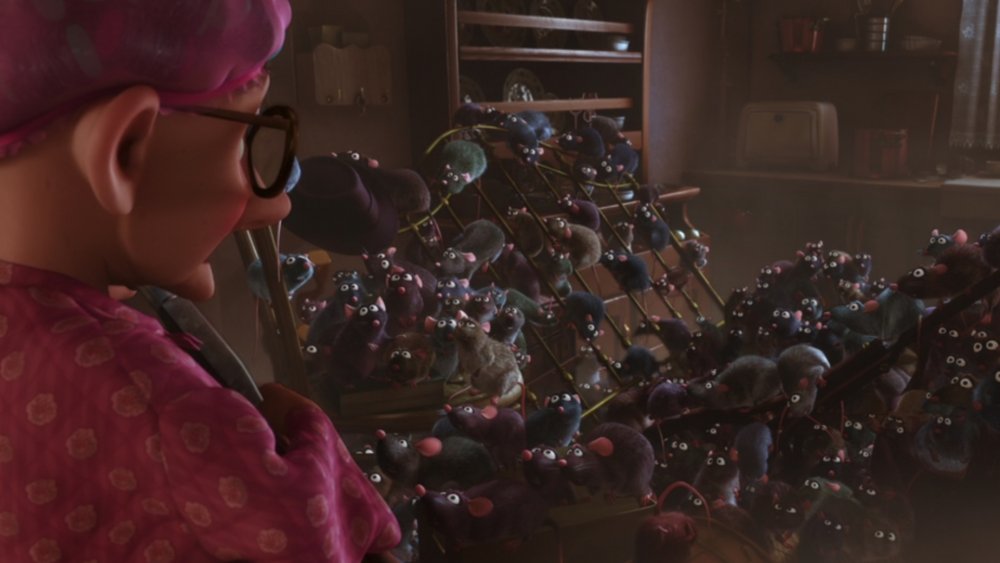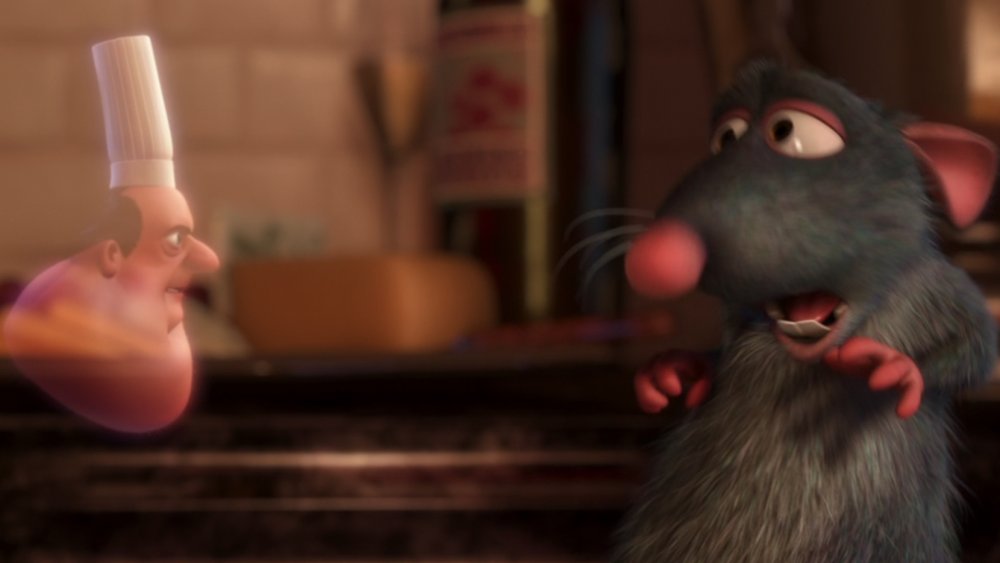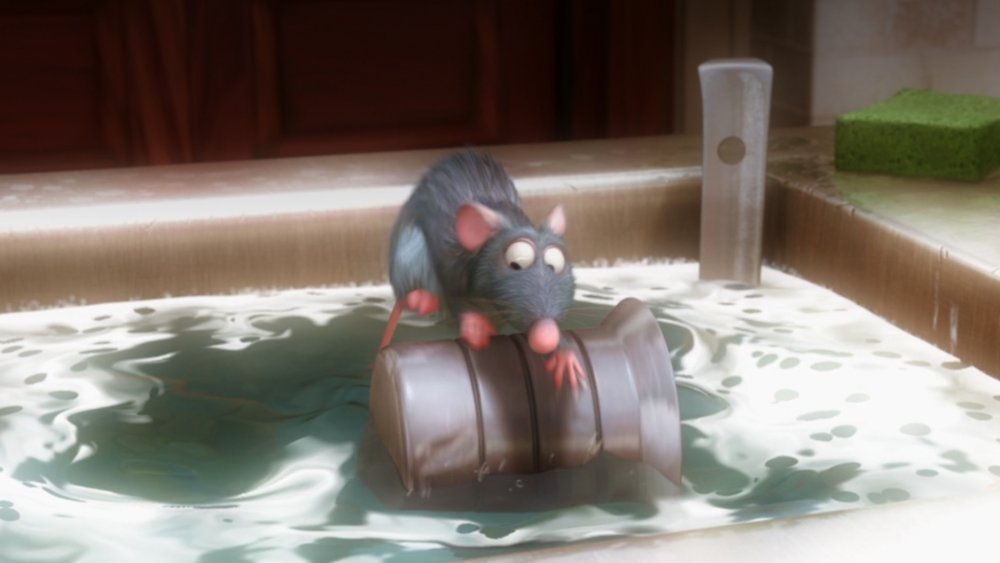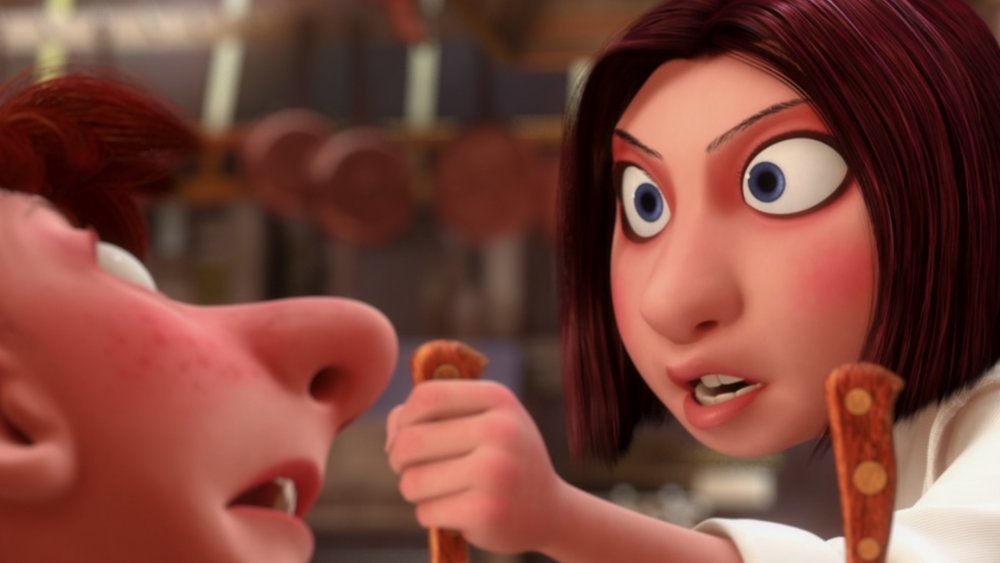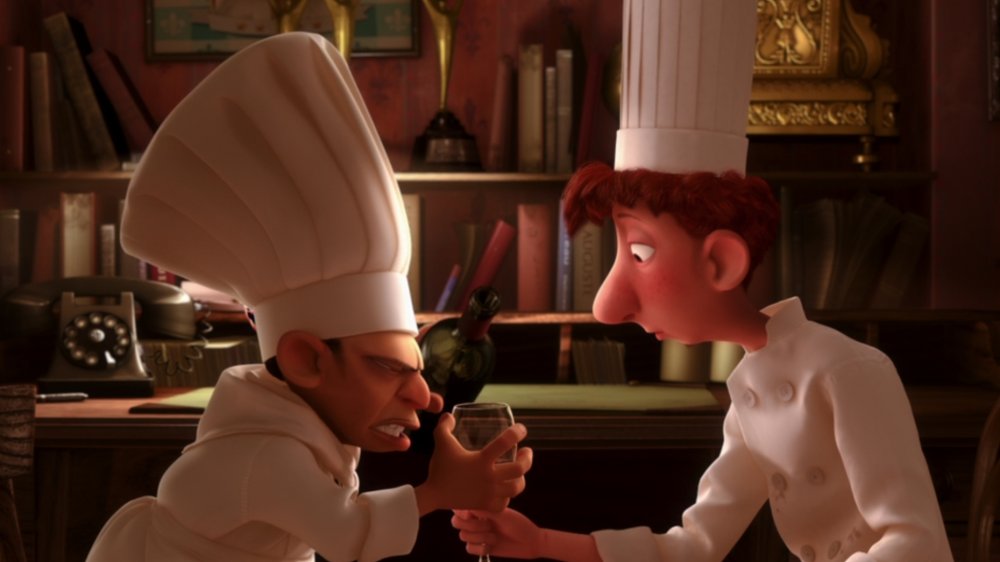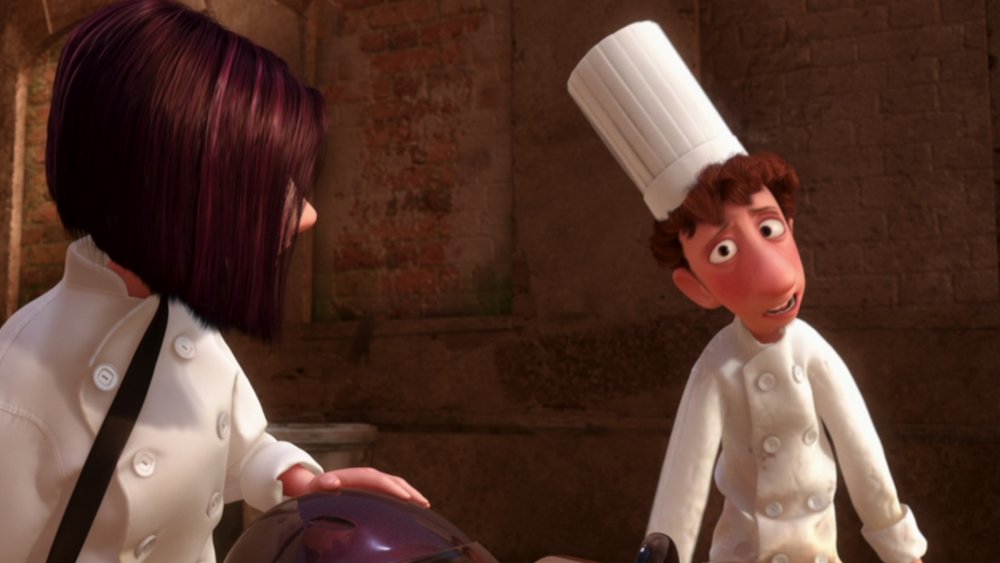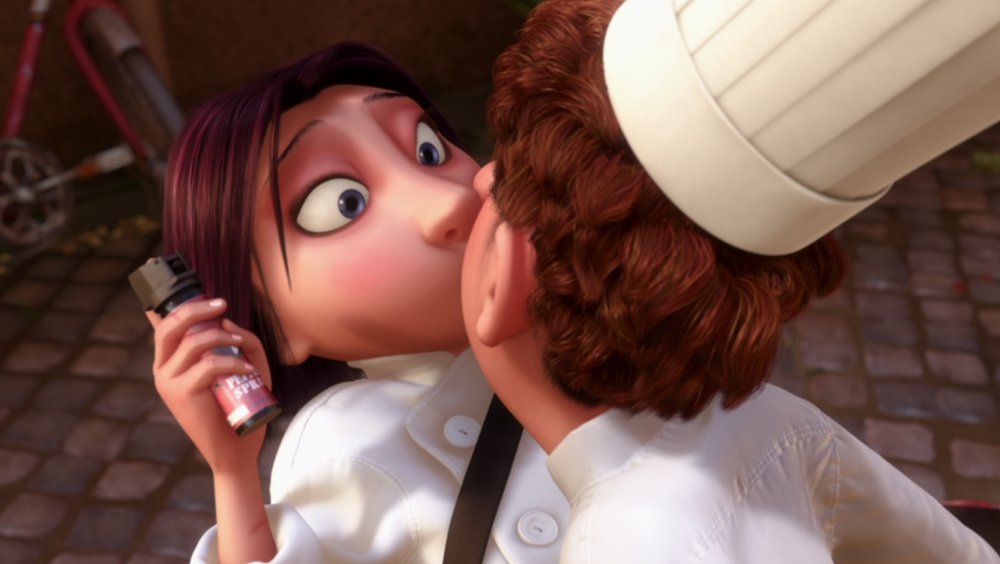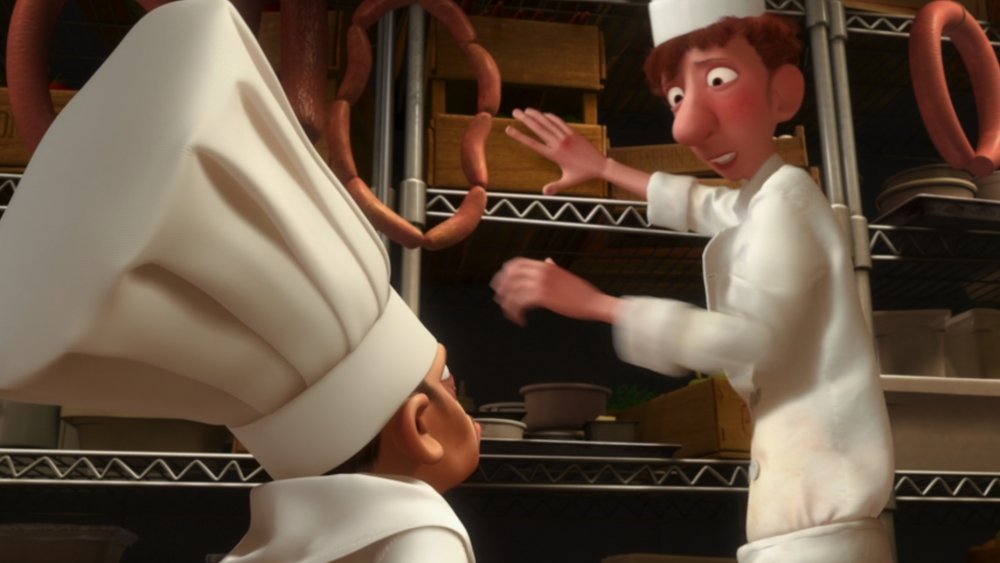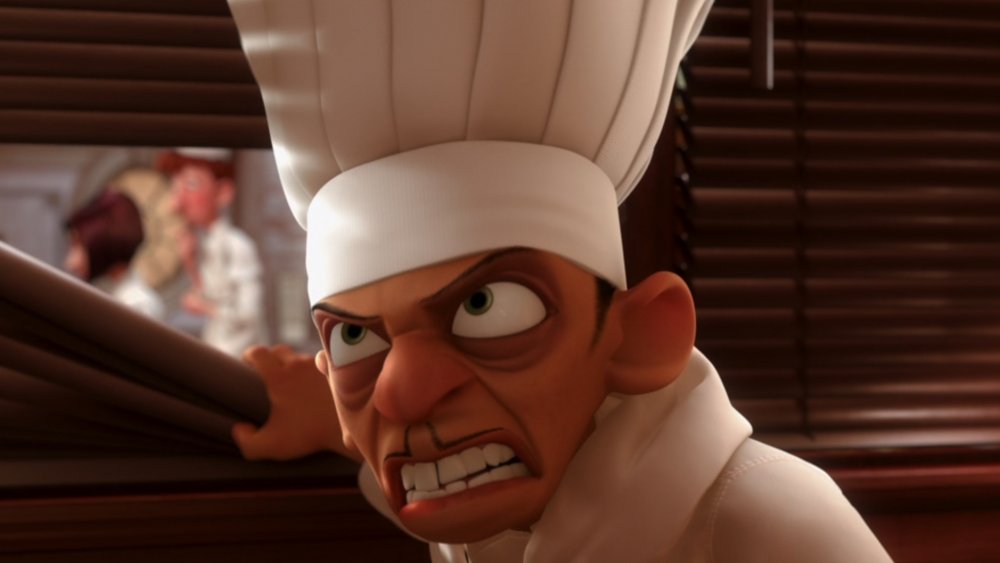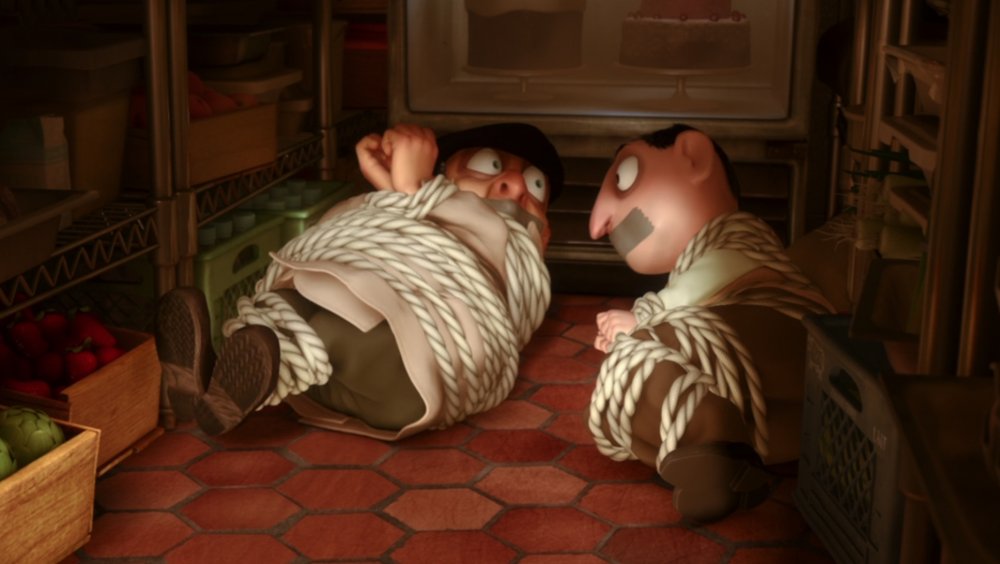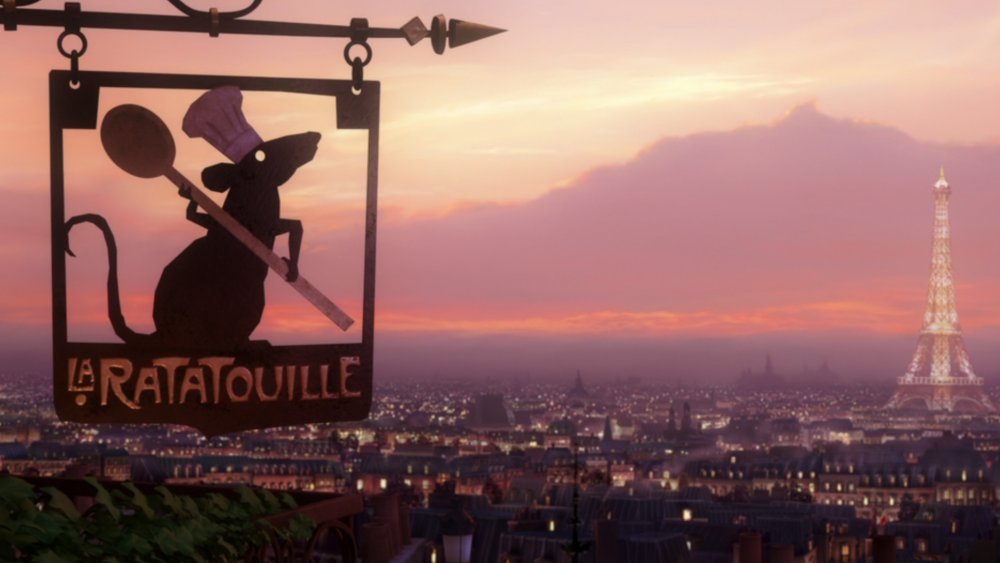Things Only Adults Notice In Ratatouille
Ratatouille manages to take an odd tale and spread a beautiful message. Set in Paris, Ratatouille focuses on a rat named Remy who follows his dreams of becoming a chef. And yeah, that's an incredibly strange plot. Even if you get over the fact that rats can't follow their dreams, rodents are a nightmare scenario for restaurant owners. But against all odds, Remy relocates to Paris and becomes a magician in the kitchen, teaching audiences that a great artist can come from anywhere.
Remy is far different from his family, as his four-legged companions eat for sustenance and Remy eats for taste, pleasure, and passion. He also walks on two feet. This magical rat (after all, he can understand humans, is lauded for his smelling abilities, and can cook) not only changes his own life, but he betters the lives of his family and friends, such as Alfredo Linguini and Colette Tatou. But even though this Pixar favorite spreads plenty of optimism while telling an extraordinary under-rodent story, there are plenty of aspects a young audience might miss — and here are things only adults notice in Ratatouille.
Mabel has a massive rat problem in Ratatouille
Mabel, an old woman who lives on the outskirts of Paris, has a rat infestation brewing in her ceiling. These rodents have taken over pretty much her entire attic, but as you might assume, the rat colony isn't welcome by Mabel. Well, once she figures out these rats exist, that is. However, thanks to Mabel, Remy's eyes are opened to the world of cooking, as she owns Auguste Gusteau's famous cookbook Anyone Can Cook.
While both are fans of Gusteau, when Mabel sees Remy and his brother Emile in her house, she goes wild ... as she should because there are rats in her home. However, she takes her panic levels all the way to crazy town by shooting at the rats with a shotgun, causing more destruction and blowing her ceiling out, which unveils the hundreds of rats that inhabit her attic. Granted, this scene is pretty important to the plot, as it scares away Remy's family and forces our hero to leave the house and discover Paris. Still, while kids might find this scene hilarious, it sends shivers of revulsion down the spines of most adults. This woman has a serious rat problem, and these guys have been responsible for spreading some of the deadliest viruses in existence (we're looking at you, hantavirus and lassa fever).
Plus, shooting up her home with a shotgun is pretty drastic and not exactly how you should be treating firearms. So while it's meant to be cute and funny when the ceiling drops down, revealing the startled rats, the whole scene is really just disturbing.
Remy's visions aren't normal
It's not uncommon for a child to have an imaginary friend, especially if said child is feeling lonely and doesn't have any buddies in real life. However, Remy's imaginary sidekick — the spirit of the deceased chef Gusteau — raises some red flags. That's because Remy listens to and does whatever Gusteau says, all because the human version of Gusteau is his hero. Eventually, Remy figures out that Gusteau is a figment of his imagination, as Remy knows everything Gusteau knows. Still, he keeps on listening to the spectral chef.
Now, we're not saying it's weird to have an imaginary friend, but we're also not saying Remy is completely well. After all, he's listening to the voices inside his head and acting on every impulse. Sure, the movie plays this off by making Gusteau's spirit one of the main characters and also a pretty funny dude. But still, taking life advice from a translucent cook isn't the best idea. In other words, Little Chef might need to get some help before he starts his own fight club.
Remy is a germ-conscious rat
Remy might be a rat, and many people think rats are, to put it lightly, repulsive. However, this particular rodent is actually germ-conscious. For example, notice the way he walks. Remy's friends and family walk on all fours, but Remy walks around on two, so he can keep his front paws clean for eating. He also jumps into a sink full of soap and water the first time he enters the kitchen of Gusteau's restaurant.
This is all subtly done by the filmmakers, and it's a continuation of Remy's personality, as he likely doesn't want to contaminate the food or other areas of the kitchen. After all, one of the most basic rules of cooking hygiene is to wash your hands before you start preparing a meal. (So when Little Chef jumps into some food to hide for a moment when he's on the run, it would be way more disgusting if he didn't scrub down prior to this food dive.) So anytime our hero is getting ready to cook, notice that he cleans his paws first. Remy, a germ-conscious rat, abides.
Ratatouille deals with themes of sexism
Even if Colette Tatou didn't drop an impressive monologue featuring a strong-minded knife show, it still wouldn't be hard for an adult to notice that she's unfairly the only female cook in the kitchen. Although a kids' movie, the masculine world of haute cuisine is fully on display in Ratatouille, and Tatou shines some light on this unfairness.
Although Tatou says that cooking is controlled by the rules of old men who make it impossible for women to cook, this message might go over the head of a younger mind, as this isn't something a child typically focuses on. Not to mention, children don't typically know about the injustices of the world yet. Either way, it's impressive that Pixar uses Tatou, one of the most talented and hard-working chefs in the kitchen, to prove a point. Here's hoping that Remy employs more women — both humans and rodents — in his new restaurant at the end of the film.
Alfredo Linguini gets pretty drunk
At one point in Ratatouille, the cleverly named Alfredo Linguini is invited into Chef Skinner's office for a glass of wine and some hearty congratulations for the critically acclaimed soup he made (with help from Remy, of course). However, in reality, Skinner's intentions are to get Linguini to spill the beans. He wants to know how this guy, a nobody with no prior skills or education in cooking, managed to make something that was worthy of "give my compliments to the chef" praise.
In the process, Linguini, who admits to not being a drinker, gets totally drunk. He might seem silly and goofy, which is funny to a younger audience, but he's binge drinking. The next day, Linguini is incredibly hungover. In fact, he's so out of it that he won't even wake up. The movie plays this off as a joke, with Remy controlling Linguini and having him use hand gestures to communicate before Colette finally slaps him awake.
Hey, we're not here to be the fun police. And we've got to admit, both of these scenes are hilarious. But showing a dude get blind drunk in a kids' movie ... well, that's definitely not what you expect to see in a Pixar film.
Wait ... Linguini never cooked before? Ever?
Look, we're not making fun of Linguini here. And admittedly, not everyone has the same upbringing, and some people just aren't skilled in the kitchen. However, prior to working at the restaurant, Linguini somehow went through life without ever having to cook a meal. Not only do takeout boxes occupy his fridge, but he admits to never cooking prior to the soup that he and Remy perfect.
This, once again, isn't a knock on Linguini. It's more jealousy than anything, as cooking can be time-consuming. And despite the fact that Gusteau hammers home that "anyone can cook," it's also a skill and way tougher than just following a recipe. (If following a recipe was easy, then the restaurant would be in better standing as Gusteau's recipes are written down. The frozen food line and lack of new dishes don't do Gusteau's any justice, though.)
Some people like to cook, and some people don't. We're envious of Linguini making it this far without having to fry an egg, let alone cook a full-course dinner. Still, we're not exactly sure how he managed to live that long without even turning on a stove.
Linguini falls for Colette incredibly fast
If you believe in love at first sight, then Linguini got a full dose when he first met Colette. That said, he tells her that he loves her shortly after meeting her. He also spontaneously kisses her, which is made even weirder by the fact that Colette was creeped out by his behavior. In fact, she was in the process of taking pepper spray out of her bag before he planted his lips on hers.
Granted, the kiss isn't exactly Linguini's fault. He was getting ready to tell Colette that Remy helped him cook. Naturally, Little Chef didn't want Linguini to give up his secret, out of fear of Colette not accepting a rat in the kitchen. So he grabbed a few handfuls of Linguini's hair and started cooking up some romance.
Although an aggressive tactic, Colette seems to enjoy the kiss and falls for Linguini. The guy should consider himself lucky, as he was on the verge of getting pepper-sprayed and coming off as, if nothing else, way too forward.
Ratatouille has a lot of innuendos
Ratatouille drops some subtle adult jokes that most children wouldn't understand, which isn't uncommon in Pixar and Disney films. For example, when head chef Skinner asks Linguini why he's been in the fridge for so long, Linguini says he's familiarizing himself with the vegetables. Skinner tells him to get out and that one can get too familiar with vegetables. This is an innuendo for ... well, to keep it semi-PG, a vegetable fetish.
A couple of more innuendos come when Linguini is trying to tell Colette that he's getting help in the kitchen from Remy. During this whole encounter, Colette is getting ready to blast him with pepper spray, and his poor choice of words don't help her feel any more comfortable. First, he admits that he has a "disturbing" secret, and when he tries to say "rat," he stops midway through the word, prompting Colette to ask, "You have a rash?" But Linguini keeps making things more and more uncomfortable, going on to say that he has "this tiny, little, little ..." while making an awkward gesture of size with his fingers. Adults might get the obvious gag, but it's going to fly over the heads of most children.
Skinner is more than a jerk
Chefs are stereotypically tough on their employees, and Skinner definitely fits this stereotype. He's not just a jerk, though. He breaks the law by withholding important information. Gusteau's will states Skinner will inherit his restaurant if no heir appears within two years after his death, which seems odd and signifies that Gusteau believes he might have a child.
Whether you want to call it fraudulent behavior, a form of embezzlement, or simply not telling the truth, Skinner receives a document saying Linguini is the rightful heir to Gusteau's restaurant. And because Skinner wants to continue to be the head chef and in control of the restaurant while making a profit off the frozen foods that are tarnishing the restaurant's brand, name, and quality, he investigates whether this claim is true. He discovers that Linguini is, in fact, Gusteau's son ... but still doesn't tell anyone, although Linguini eventually inherits the restaurant thanks to Remy. This is all a very serious matter and easy to understand in the eyes of an adult. Basically, you can't steal another person's restaurant.
The rats kidnap people
There's technically not a law that states a rat can't abduct someone and tie them up, but it's still pretty weird when the rats kidnap the health inspector because he sees them all in the kitchen. For good measure, Skinner also becomes a victim of kidnapping when he sees the rats occupying the kitchen.
We know what people might be thinking. It's a kids' movie, and there was no harmful behavior intended, but it's hard not to notice that, although rodents, the rats kidnapped two people to continue to cook and solve their current issue of serving Anton Ego a chef's kiss-worthy dish. Of course, the rats, Linguini, and Colette aren't completely let off the hook as the restaurant is closed shortly after because, you know, there were rats in the kitchen, which breaks a health code or two. Luckily, a new restaurant opens, and everyone lives happily ever after, and no one goes to jail for holding people against their will.
Pay attention to the restaurants at the end of Ratatouille
At the end of Ratatouille, the movie concludes with two new restaurants — La Ratatouille for humans and a rat-sized bistro for rodents. While it all happens so fast, when viewed with a closer eye, the audience will see the makeup of this little bistro, which consists of, as BuzzFeed points out, teacups as chairs, ramekins as tables, buttons as plates, pins as utensils, Christmas lights to brighten the place up, and cocktail umbrellas to provide some shade.
Ego is also seen at the new restaurant (the one for humans, of course). Although no longer a food critic, he's in good spirits and appears to have gained weight, which is a callback to him not eating food that he doesn't love. (If he doesn't love the food, he doesn't eat it, which might be why he seems so miserable and in bad spirits for most of the movie, as he's in search of the perfect bite.) Now, he's a regular at the new restaurant as a mere fan and investor, and he clearly loves everything on the menu. Linguini also finds a sense of purpose as a server, and Colette and Remy, rightfully so, are finally seen as legitimate chefs.
